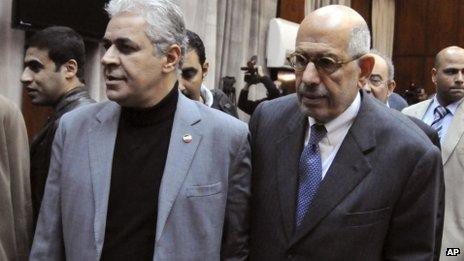Profile: Egypt's National Salvation Front
- Published

The National Salvation Front (NSF) is an opposition coalition formed amid the recent political crisis which has engulfed Egypt.
It has successfully brought together the country's fractious and divided opposition factions, who are now united in their resistance and rejection of what they see as a power grab by the president and his Islamist allies.
On 22 November, President Mohammed Morsi issued a constitutional declaration in which he granted himself far-reaching powers. It stated that his decisions were "final and unchallengeable" until a new constitution had been ratified and fresh parliamentary election held.
The declaration also said the constituent assembly could not be dissolved by the judiciary, pre-empting an expected ruling by the Supreme Constitutional Court on its legitimacy. Liberals, Christians and secularists had complained that the assembly was dominated by Islamists.
The president portrayed his decree as an attempt to protect the transition to a constitutional democracy, but many Egyptians were outraged by the apparent power-grab and there were widespread protests.
On 24 November, a number of political parties and leading figures formed a coalition to force the president to rescind his decree; form a new, more representative constituent assembly; and issue a transitional justice law that guaranteed fair retrials for those responsible for the deaths of protesters during the uprising that ousted Hosni Mubarak.
The NSF includes a wide range of liberal, secular and leftist groups, such as the Egyptian Popular Current, al-Dustour, al-Tajammu, Free Egyptians, New Wafd, Democratic Front, the Egyptian Social Democratic Party, Nasserist Democratic Party and the Conference Party.
Its three most prominent leaders are Mohammed ElBaradei, the former head of the UN's International Atomic Energy Agency (IAEA); Amr Moussa, the former secretary general of the Arab League; and Hamdeen Sabahi, a Nasserist politician who came third in the presidential election.
'Seething and chaos'
On the day the NSF was founded, Mr ElBaradei said the president's decree threatened Egypt's transition and created a "new pharaoh".
"We will have to continue to escalate our level of expressing resistance, peaceful disobedience," he told Reuters and the Associated Press.
Within two days, Mr Morsi agreed with the judiciary to limit the scope of his decree, promising it would be restricted to "acts of sovereignty". But he insisted on preserving his power to protect the constituent assembly.
There was further outrage on 30 November, when the constituent assembly approved a rushed version of the draft constitution to avoid dissolution by the SCC, despite a boycott by Christian, liberal and secularist representatives. Mr Morsi subsequently called a referendum for 15 December.
The NSF said the president was "trying to impose a constitution monopolised by one trend and is the furthest from national consensus, produced in a farcical way". Its leaders called for the referendum to be postponed and said they would consider a boycott if it was not.
Opposition protests were stepped up, and tens of thousands took to the streets of Cairo chanting for Mr Morsi's downfall and even his imprisonment. There were deadly clashes on 5 December when opposition demonstrators were confronted by Muslim Brotherhood supporters outside the presidential palace.
In a televised speech the next day, Mr Morsi called for a "national dialogue" to resolve the crisis, but insisted that he would not rescind his decree and that the referendum could not be delayed.
The NSF rejected the invitation to talks with the president and reiterated its demands to begin an overhaul of the constituent assembly. "He has to take these steps, and I hope that he listens to us," Mr ElBaradei said.
On 8 December, the president bowed to the pressure and rescinded most of his 22 November decree. He did not, however, agree to the opposition's demand that he postpone the referendum.
The NSF swiftly rejected the concession and suggested it was planning to boycott the referendum. Spokesman Sameh Ashour warned that organising such a vote "in a state of seething and chaos" amounted to a "reckless and flagrant absence of responsibility, risking driving the country into violent confrontations that endanger its national security".
The coalition has vowed to stage more mass protests in the coming days.
BBC Monitoring reports and analyses news from TV, radio, web and print media around the world. For more reports from BBC Monitoring, click here. You can follow BBC Monitoring on Twitter and Facebook.